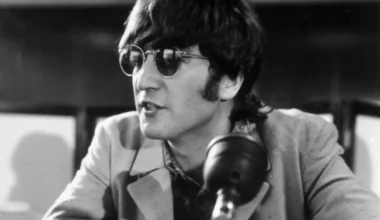David Gilmour was remarkably forthright about the band’s composition prior to the significant rift that caused Pink Floyd to split, pointing out both its advantages and disadvantages. Speaking candidly about his complex relationship with Roger Waters, who left the group following 1983‘s The Final Cut, he frequently voiced his doubts about certain songs. Gilmour cut through all pretence with direct, astute remarks that were as sharp as a newly sharpened blade.
Ironically, Gilmour and Waters have always had a very similar perspective on the history of Pink Floyd. Despite their bitter breakup that resulted in enough animosity to last until today. Many regard The Dark Side of the Moon, released in 1973, as the quartet’s masterpiece. Waters claims it put an end to the group “once and for all.” It is a cerebral concept album that explores ageing, mental health issues, and other distinctly human matters with immense lucidity.
Although it may seem odd at first that Waters would cast such a sombre shadow over the band’s masterpiece. His argument was important. He somewhat cynically asserted that every group’s ultimate goal is to be successful. More importantly, he maintained that once you reach the pinnacle of commercial triumph, it’s all downhill from there in terms of both business and artistic success. After his 1987 departure, the group released popular albums like Wish You Were Here, Animals, and The Wall. They made this comment in that context.
In a 1992 interview with Musician, Gilmour talked about the demanding nature of global recognition while talking about his second solo album, 1984‘s About Face. Pete Townshend, the driving force behind The Who, wrote the songs “All Lovers are Deranged” and “Love on the Air.” The current Pink Floyd frontman used them to compare their respective roles in the bands and solo endeavors. He then talked about how being a part of the “Money” group “restricted” him.
While democratically pointing out that musicians in bands always feel a little bit constrained in whatever they attempt. Gilmour suggested that Townshend felt similar limitations on how his creativity manifested inside The Who’s walls. The group’s diverse personalities that coexist there are the reason for this. Also, the established roles develop over the course of the extended membership.
“I know he’s felt uncomfortable about certain things. Things he could express in solo stuff,” the speaker said in his explanation. More than anything else, the limitation for me was the scope of what Pink Floyd had become. Going to the theatre is a nice way to experience something on a slightly different scale. Something that isn’t really possible with Pink Floyd until we get a lot less popular. Gilmour insisted that while he enjoyed “the grand scale of Pink Floyd,” the band’s responsibilities were “nicely” different from his own. This was especially true when he performed as a solo artist.
Even with drummer Nick Mason and keyboardist Rick Wright being virtually absent during the recording process, the guitarist drew a distinction between how he approaches the band and his own work in response to the suggestion that the group’s debut album without Waters, 1987‘s A Momentary Lapse of Reason, was essentially a solo album. Curiously, Gilmour has since expressed disapproval of the record.
While he acknowledged that there was a blurring of boundaries between solo albums and other records, Gilmour took a different approach to it. He pointed out that this difference was evident in his “thought process.” Realistically, he noted he could’ve sold more About Face copies by tapping into “Big Music” zeitgeist. This could have happened if he had guided it more in the direction of Pink Floyd.








